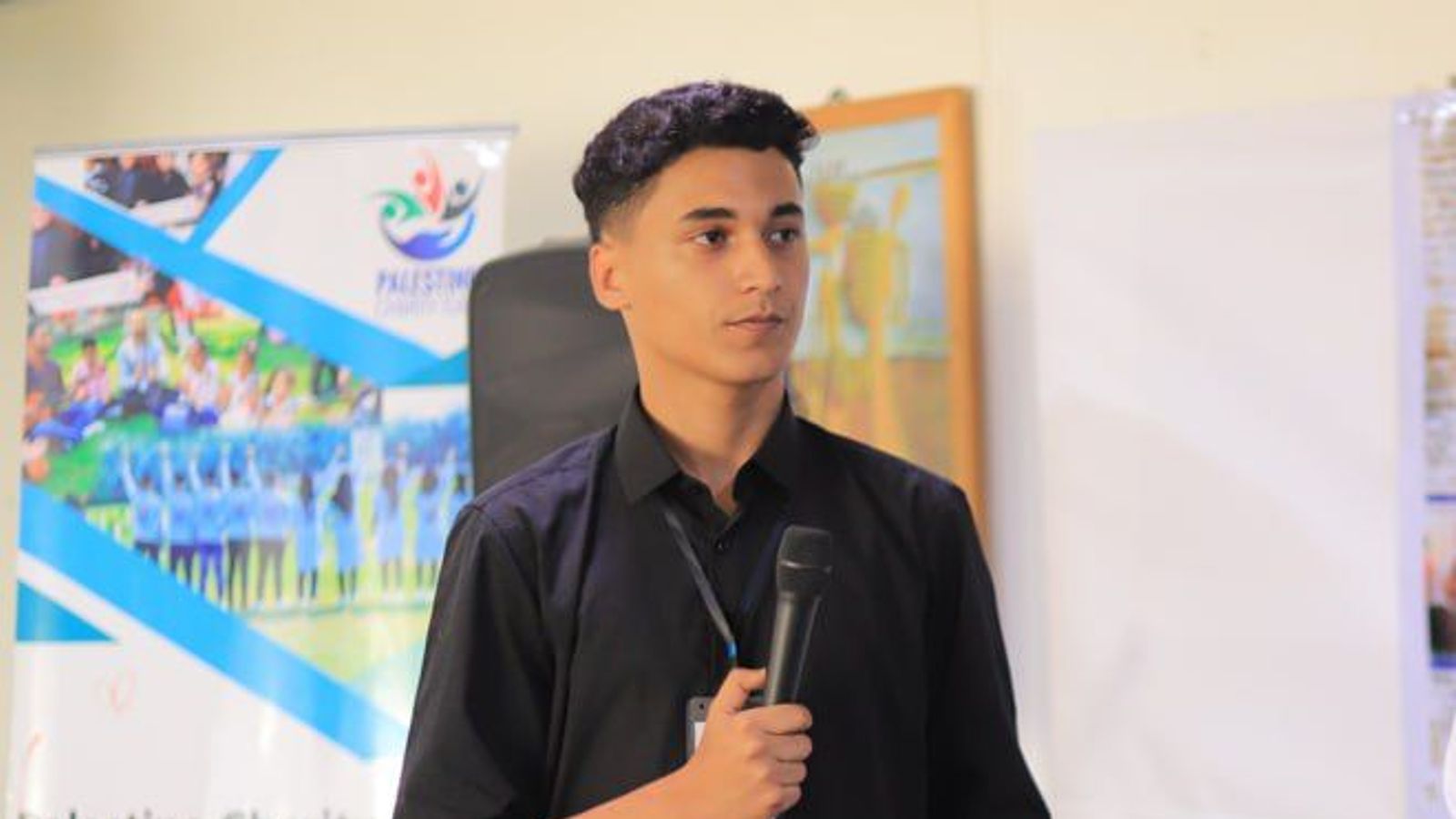“I’m down now for chatting,” Naser Al-Kharaz told me from the Gaza Strip via WhatsApp before we called. “But make it as quick as possible… there’s no electricity or internet. I can barely be online.”
The 20-year-old works with Palestine Charity Team, teaching music to children in Gaza refugee camps to “give them the way to describe their feelings”.
But now he is the one describing his feelings, hurriedly, because his phone has just 9% battery left, and chaotically, because he is poised to run from an airstrike at any second.
Israel-Gaza latest: Israel releases graphic photos of dead babies
Please use Chrome browser for a more accessible video player
“Everything is miserable,” he says on the phone. “There is no electricity, no water, [we] barely have food,” says the musician, who has not showered for two days in order to save water.
“Normally I can speak English really well, but now I can’t even, like, have a sentence in my mind,” he says, apologising.
But his English is still virtually word-perfect, delivered in an American accent, with all the “man”s and “you know”s you’d expect from a confident young man who likes hip-hop.
Israel-Hamas war: How did this happen?
Blinken backs Israel | Criminals could go free as prisons fill up
Gaza ground offensive will be ‘high-risk and very dangerous’ for Israel’s military
Israel has ordered a “complete siege” of the densely populated coastal enclave, cutting off food, water, electricity and medicines, as it strikes back after an unprecedented attack by Hamas militants.
Defying pleas from United Nations experts for a relief to the siege, today Israel said it would lift it only when Hamas had released all Israeli hostages.
Before and after images from 27 September and 12 October show devastation from Israeli bombing
Yesterday Gaza’s energy station ran out of power, and some homes are eking out a few more days of power from generators. Internet is disappearing.
Speaking from his aunt’s house, Naser said he had fled his home amid warnings of airstrikes. He can’t remember exactly what happened, or how he arrived at his aunt’s.
His thoughts pour out, chaotic and confused: “I can’t even hold my guitar to try to do something. My brain just, ah, I can’t really talk well, I can’t sleep well, actually.
He’s not certain he’s eaten today, or how much food his family have left. But when people around you are dying, “you don’t have even the spirit to eat, [let alone] do music.
Read more:
‘Hundreds of children and women killed’ in Israeli strikes on Gaza
Why Israel is braced for Hezbollah attack from Lebanon
How hostage negotiators will be working to free Hamas captives
Naser ‘lost a lot of friends’
Yesterday he picked up his guitar because “I wanted to, like, feel free, a little bit.” But “when I hold the thing, I just, you know, I literally forgot how to play the guitar.”
It seems it is hard to think straight when you’ve been running for your life, your friends have died, and your family are terrified of everything, including this very phone call.
He has “lost a lot of friends”, but can’t remember who, exactly, other than Abdullah, who was killed in an airstrike yesterday.
“What he did do deserve to die? He is just a musician. He is living his life.”
Please use Chrome browser for a more accessible video player
‘Thank God nobody from my family died yet’
Naser went to Abdullah’s house to help, but when he arrived he realised there was nothing he could do.
“They are already under the house, under the collapse… And so I just started to record. Maybe that’s the only thing that I can do now.”
Be the first to get Breaking News
Install the Sky News app for free
Our conversation jumps around: one moment we are talking about Abdullah, one moment about his neighbour, the chaos of the world outside seeping into our phone call.
But he says he is “not that sad and I’m not that depressed, because everyone is going through a lot of bad things.”
“Thank God nobody from my family died yet.” He uses “yet” deliberately, “because maybe that’s going in any second”.
He is calling from the front door of his aunt’s home, apologising in advance in case he has to drop the phone and run if he hears an airstrike. “That’s why I’m a little bit stressed”.
But the longer we speak, the harder it is to keep up a brave face.
‘We really don’t deserve this’
By the end of the call he tells me, trying not to cry: “The only thing I wanna say, man, we don’t deserve this. We really don’t deserve this.”
I ask him how things are in the street, but he doesn’t know, because it’s too dangerous to go outside.
“You can’t go anywhere because you’re just running away from death and you’re going to find it everywhere. That’s why I just prefer to stay at home and, you know, wait for the destiny, as they say.”





